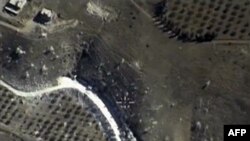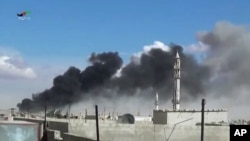The start of Russian airstrikes to prop up embattled Syrian President Bashar al-Assad's government could trigger a new wave of foreign fighters, strengthening jihadists across the region, experts say.
U.S. intelligence officials have been warning about potential fallout since Moscow began expanding its military footprint in Syria earlier this month. But such calls have taken on greater urgency with Russian bombs falling on Syrian targets as of Wednesday.
"There's no doubt extremists will look to amplify their recruiting pitches to would-be foreign fighters by capitalizing on Russia’s expanded role in Syria," a U.S. counterterrorism official told VOA. "It could also help energize jihadi efforts both inside and outside Syria."
The concerns are being echoed by activists and former diplomats, who charge Russia is playing into the hands of groups like the Islamic State and Jabhat al-Nusra by deliberately targeting civilian areas.
"The Russian action is going to be an accelerant for global jihad," said Salman Shaikh, a former special assistant at the United Nations who is now founder and chief executive officer of the Shaikh Group.
"You can hear 'Allahu Akhbar'" – God is great – "being shouted from Europe and its streets, even [in] the United States and Southeast Asia," he said.
The Russian Orthodox Church may have provided jihadists with additional motivation Wednesday when it issued a statement in support of the airstrikes, calling them part of a "holy war."
Anticipating fight
Already, some Syrians are relishing the prospects of a fight with Moscow.
"A lot of Syrians are looking forward to facing up to the Russians face to face and talking quite loudly about Afghanistan and other such quagmires that the Russians got themselves into," Shaikh said.
They could soon get their chance.
"While Russia claims that it will not use ground troops and will only limit its involvement to air support, this will not necessarily stay set in stone," said IHS Country Risk Analyst Alex Kokachov, pointing to Russia’s initial denials of using ground forces in Crimea and eastern Ukraine.
U.S. officials concerned
It is a scenario that worries U.S. officials.
"Many modern terrorist groups are rooted in the legacy of battling the former Soviet Union in Afghanistan," a counterterror official said. "It would not be surprising if ISIL features the Russian buildup as a tie into their apocalyptic narrative, and to help bridge the generational divide among jihadists with Moscow’s actions in Afghanistan and Syria as bookends."
Former diplomats caution that other countries are also likely to contribute to the escalation, sending more arms, money and other support to both jihadists and other, more mainstream opposition groups.
"Everyone is very scared," said Bassam Barabandi, a Syrian diplomat turned activist, who spent parts of Wednesday communicating with contacts in areas targeted by the Russian airstrikes. "We don't want people to come to fight Russia in Syria."
"The only benefit will be [for] the extremists," he added.





